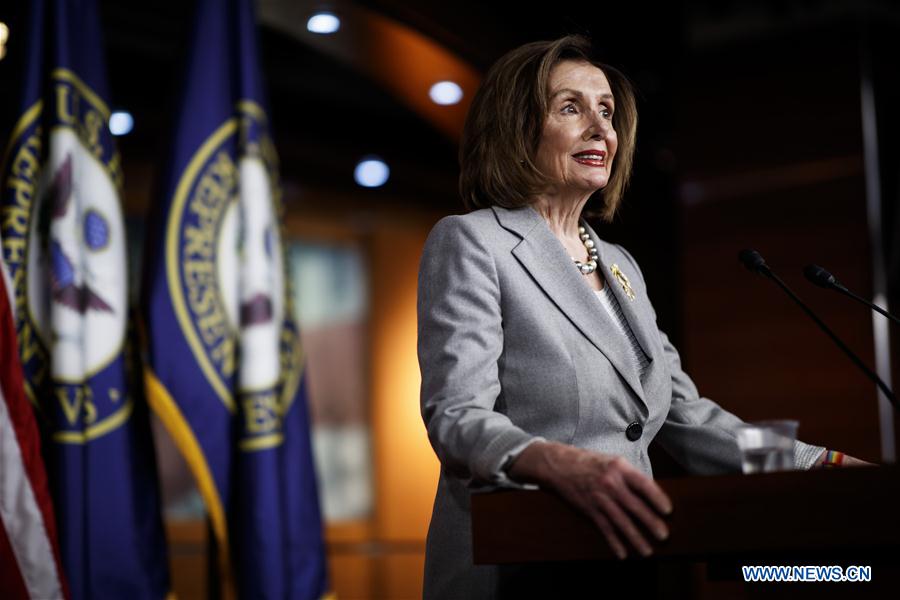
U.S. House Speaker Nancy Pelosi speaks during a press conference on Capitol Hill in Washington D.C., the United States, on Dec. 12, 2019. After a two-day marathon debate, the U.S. Democrat-led House Judiciary Committee on Friday passed both articles of impeachment, accusing President Donald Trump of abusing power and obstruction of Congress. (Photo by Ting Shen/Xinhua)
WASHINGTON, Dec. 13 (Xinhua) -- U.S. Democrat-led House Judiciary Committee passed all the two articles of impeachment against President Donald Trump on Friday, who will be impeached if the full House approves any of them by a simple majority vote.
"Next week, these two articles of impeachment - on abuse of power and obstruction of Congress - will come to the House Floor for consideration," House Majority Leader Steny Hoyer announced shortly after the panel's votes.
After a two-day marathon debate sparring over Trump, the committee eventually voted separately on each of the articles precisely along partisan lines. Committee Chairman Jerry Nadler postponed the final votes on the articles to Friday after more than 14 hours of debate on Thursday.
Democrats outnumbered Republicans on the panel 24 to 17, with 23 Democrats voting to send the measures to the full House. One Democrat, Ted Lieu from California, was absent after undergoing an unexpected medical procedure earlier in the week.
All 17 panel Republicans voted no, arguing that the evidence is thin and weak. They also criticized Democrats were pushing a rapid-paced impeachment which will set a dangerous precedent.
Trump is the fourth U.S. president in American history to face impeachment. If he were impeached, he would be the third U.S. president to face a trial in the Senate.
Trump has repeatedly denied any wrongdoing, slamming the Democrats' effort as a "witch hunt "and hoax.
"All of our presidents would be impeached under this Rogue House of Democrat Leadership," Trump said on Twitter before the vote on Friday morning.
"The Republican Party is more united now than at any time in its history - by far!" the president said in a series of tweets. "The Do Nothing Democrats have become the Party of lies and deception!"
Before Friday's final votes, the committee discussed potential amendments. However, Republicans failed to remove or limit the accusations.
"The central issue of this impeachment is the corruption of our institutions that safeguard democracy by our president," Nadler said during the debate.
Doug Collins, the top Republican on the panel, accused that the Democrats have been intent on removing Trump from office, calling the impeachment proceedings a "farce".
"We have been on this path since November 2016," Collins said during the debate.
"They might as well have been speaking different languages, from alternate realities," a report of The New York Times commented on the lengthy debate.
House Speaker Nancy Pelosi suggested at her weekly press conference on Thursday that Democrats would have the enough votes to pass the impeachment articles without Republican support.
"No one is above the law; the president will be held accountable for his abuse of power and for his obstruction of Congress," Pelosi told reporters. "It is urgent."
"There's no chance the President will be removed from office," Senate Majority Leader Mitch McConnell said on Thursday night, vowing he would be "in total coordination" with the White House as he plots the Republican strategy for an seemingly inevitable impeachment trial.
"Everything I do during this I'm coordinating with the White House counsel. There will be no difference between the president's position and our position as to how to handle this," the top Republican in the Senate told Fox News in an interview. "My hope is there won't be a single Republican who votes for these two articles of impeachment."
Americans' support for impeachment against Trump has remained virtually unchanged from last month despite several weeks of public testimony, according to a new Monmouth University poll released Wednesday.
The House Judiciary Committee released a report last week explaining the constitutional grounds for the impeachment, accusing Trump of abusing his office by pressuring Ukrainian President Volodymyr Zelensky into launching investigations that could benefit Trump politically during the 2020 U.S. elections.
Trump claimed "nothing came out" of his July phone conversation with Zelensky, an episode standing at the center of the impeachment proceeding initiated by House Speaker Nancy Pelosi in late September. The White House has refused to participate in the impeachment proceeding, accusing Democrats of an unfair process.
According to the nation's constitution, the House shall have the sole power of impeachment while the Senate shall have the sole power to try all impeachments. Conviction can only happen in the Senate and requires at least two-thirds of its members, or 67 senators, to vote in favor after a trial. Currently, the Senate has 53 Republicans, 45 Democrats and two independents.











